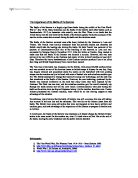The importance of the Battle of the Somme
The Battle of the Somme is a hugely significant battle during the middle of the First World War (1st July 1916). Many historians use the Battle of the Somme (and other battles such as Passchendaele 1917) to determine who actually won the War. There is no doubt that the Allied forces won the war however the Battle of the Somme greatly limits the successes of the war due to the events that occurred during the battle and the decisions made.
The Battle of the Somme occurred soon after heavy defeats by the Germans in Loos and Verdun. The French were heavily weakened from the previous battles and therefore the British would take the leading role during this battle. Sir John French was removed of his position of Commander-in-Chief due to the handling of the reserves at Loos and was succeeded by Douglas Haig in December 1915. After the failure at Verdun, Haig wanted to make sure that the Battle of the Somme was deemed a success. However, this was later proven to be very difficult as the Germans had plenty of time to build trenches at least 40 ft deep. Therefore the heavy bombardment of the German trenches produced less of an effect than Haig and British Expeditionary Force would have wanted.







